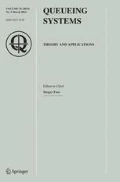Abstract
We consider a single-server queue with renewal arrivals and i.i.d. service times, in which the server employs either the preemptive Shortest Remaining Processing Time (SRPT) policy, or its non-preemptive variant, Shortest Job First (SJF). We show that for given stochastic primitives (initial condition, arrival and service processes), the model has the same fluid limit under either policy. In particular, we conclude that the well-known queue length optimality of preemptive SRPT is also achieved, asymptotically on fluid scale, by the simpler-to-implement SJF policy. We also conclude that on fluid scale, SJF and SRPT achieve the same performance with respect to state-dependent response times.
We’re sorry, something doesn't seem to be working properly.
Please try refreshing the page. If that doesn't work, please contact support so we can address the problem.
References
Addie, R., McNickle, D.: Comparing different approaches to the use of DiffServ in the internet. In: IEEE TENCON 2005, pp. 1–6. IEEE, New York (2005)
Bansal, N., Harchol-Balter, M.: Analysis of SRPT scheduling: investigating unfairness. In: Proceedings of ACM Sigmetrics 2001, New York, 2001, pp. 279–290. ACM Press, New York (2001)
Billingsley, P.: Convergence of Probability Measures. Wiley, New York (1968)
Down, D.G., Gromoll, H.C., Puha, A.L.: Fluid limits for shortest remaining processing time queues. Math. Oper. Res. 34, 880–911 (2009)
Down, D.G., Gromoll, H.C., Puha, A.L.: State-dependent response times via fluid limits in shortest remaining processing time queues. SIGMETRICS Perform. Eval. Rev. 37(2), 75–76 (2009)
Gromoll, H.C., Kruk, Ł., Puha, A.L.: Diffusion limits for shortest remaining processing time queues. Stoch. Syst. 1, 1–16 (2011). arXiv:1005.1035v1 [math.PR]
Harchol-Balter, M., Sigman, K., Wierman, A.: Asymptotic convergence of scheduling policies with respect to slowdown. Perform. Eval. 49, 241–256 (2002)
Nuyens, M., Zwart, B.: A large-deviations analysis of the GI/GI/1 SRPT queue. Queueing Syst. 54(2), 85–97 (2006)
Prokhorov, Y.V.: Convergence of random processes and limit theorems in probability theory. Theory Probab. Appl. 1, 157–214 (1956)
Schrage, L.: A proof of the optimality of the shortest remaining processing time discipline. Oper. Res. 16(3), 687–690 (1968)
Schreiber, F.: Properties and applications of the optimal queueing strategy SRPT—a survey. AEÜ, Arch. Elektron. Übertrag.tech. 47, 372–378 (1993)
Smith, W.: Various optimizers for single-stage production. Nav. Res. Logist. Q. 3, 59–66 (1956)
Wierman, A.: Nuyens, M. Scheduling despite inexact job-size information. In: SIGMETRICS’08: Proceedings of the 2008 ACM SIGMETRICS International Conference on Measurement and Modeling of Computer Systems, New York, NY, USA, 2008, pp. 25–36. ACM, New York (2008)
Author information
Authors and Affiliations
Corresponding author
Rights and permissions
About this article
Cite this article
Gromoll, H.C., Keutel, M. Invariance of fluid limits for the shortest remaining processing time and shortest job first policies. Queueing Syst 70, 145–164 (2012). https://doi.org/10.1007/s11134-011-9267-5
Received:
Revised:
Published:
Issue Date:
DOI: https://doi.org/10.1007/s11134-011-9267-5
Keywords
- Queueing
- Queue length
- Shortest remaining processing time
- Shortest job first
- Shortest job next
- Fluid limit

